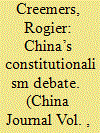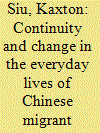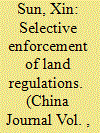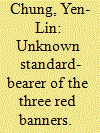|
|
|
Sort Order |
|
|
|
Items / Page
|
|
|
|
|
|
|
| Srl | Item |
| 1 |
ID:
139859


|
|
|
|
|
| Summary/Abstract |
China’s controversial one-child policy continues to generate controversy and misinformation. This essay challenges several common myths: that Mao Zedong consistently opposed efforts to limit China’s population growth; that consequently China’s population continued to grow rapidly until after his death; that the launching of the one-child policy in 1980 led to a dramatic decline in China’s fertility rate; and that the imposition of the policy prevented 400 million births. Evidence is presented contradicting each of these claims. Mao Zedong at times forcefully advocated strict limits on births and presided over a major switch to coercive birth planning after 1970; as much as three-quarters of the decline in fertility since 1970 occurred before the launching of the one-child policy; fertility levels fluctuated in China after the policy was launched; and most of the further decline in fertility since 1980 can be attributed to economic development, not coercive enforcement of birth limits.
|
|
|
|
|
|
|
|
|
|
|
|
|
|
|
|
| 2 |
ID:
139850


|
|
|
|
|
| Summary/Abstract |
In 2013, a debate on constitutionalism erupted between liberals advocating better implementation of China’s Constitution and anti-constitutionalist voices claiming that this would harm the political order and the reform project. The debate emerged against the background of a choppy political transition and proliferating social concerns, as well as hopeful expectations regarding the new leadership. However, the anti-constitutionalist position was closely aligned with the new Politburo Standing Committee’s agenda, which continues to reject the notion of a law-based political order and institutionalization of fundamental relationships between the Party, the state and citizens. This has significant implications for the direction of Chinese legal reforms and related scholarly understandings.
|
|
|
|
|
|
|
|
|
|
|
|
|
|
|
|
| 3 |
ID:
139847


|
|
|
|
|
| Summary/Abstract |
How have Chinese migrant workers’ patterns of everyday life changed over the past two decades, and what has not changed? Have their personal and career aspirations shifted over time? What changes have occurred in how they maintain social relationships within and across factories? What are the implications for migrant workers, local governance and factory managements? Based on workers’ letters and ethnographic research in Shenzhen, this article argues that migrant workers encounter very different circumstances today in their housing, food, time scheduling, aspirations and ways of maintaining social relationships. yet young migrant workers still invoke social relationships steeped in links to family and village to cope with daily difficulties. I examine the workers’ greater control over their time, local governments’ growing need to accommodate migrant workers’ requirements in order to maintain social stability, and the increasing pressure on factory managements to consider workers’ work/leisure arrangements, especially during peak industrial seasons.
|
|
|
|
|
|
|
|
|
|
|
|
|
|
|
|
| 4 |
ID:
139853


|
|
|
|
|
| Summary/Abstract |
Affluent Chinese consumers are increasingly “opting out” of the Chinese marketplace, drawing upon their social networks and superior economic resources to purchase foreign infant formula that they believe to be untainted by contact with China’s suspect markets and untrustworthy distribution channels. Based on interview and media sources, we document these consumer practices and characterize them as highly privatized forms of “gated consumption” which reflect broader patterns of Chinese middle-class lifestyles. As a strategy for dealing with food-safety concerns and marketplace distrust, gated consumption is seemingly apolitical and individualized, yet at the same time exemplifies the fragility of the Chinese Party-state’s promises of prosperity and material well-being.
|
|
|
|
|
|
|
|
|
|
|
|
|
|
|
|
| 5 |
ID:
139843


|
|
|
|
|
| Summary/Abstract |
When faced with homeowners who refuse to accept appropriation of their property, local authorities often use family ties to extend the state’s reach. To complete urban renewal, municipal demolition offices turn to resisters’ relatives who work for government bureaus, state-owned factories, schools and hospitals. Under pressure and the threat of sanctions, many work-unit members agree to pressure their relatives into signing demolition agreements, often by tapping into “feelings of affection” and emotional blackmail. Beyond emptying a neighborhood, “harmonious demolition” has many consequences: it can turn relatives against each other, lead to divorce, and produce disillusionment and anger. Although “demolition by implicating family members” was banned in 2010, it continues. Using vertical ties to pressure unit members and horizontal ties to influence relatives does not herald a softer authoritarianism, but instead alienates homeowners and work-unit members alike.
|
|
|
|
|
|
|
|
|
|
|
|
|
|
|
|
| 6 |
ID:
139849


|
|
|
|
|
| Summary/Abstract |
Despite the government’s decades-long enforcement efforts, violations of land laws and regulations remain a serious problem in China. Local governments have often been blamed. This article identifies a previously overlooked reason for large-scale violations, by examining the enforcement behavior of the central government. It argues that the government enforces land regulations selectively, depending on the violators’ political status. The article focuses on the national policy prohibiting new golf course construction, finding that golf course developers connected with high-level political élites are more likely to violate the prohibition and survive subsequent enforcement actions by the central government. This finding contributes to the literature on regulatory enforcement in authoritarian regimes and has broad implications for reforms in China.
|
|
|
|
|
|
|
|
|
|
|
|
|
|
|
|
| 7 |
ID:
139858


|
|
|
|
|
| Summary/Abstract |
As a senior member of the Chinese Communist Party Politburo, second-in-command of the Central Secretariat and Party secretary of Beijing Municipality, Peng Zhen was trusted by Mao Zedong and exerted power and influence over Chinese politics during the period before the Cultural Revolution. However, the significance of his role in the Great Leap Forward has been underestimated and misunderstood. This article investigates Peng’s active leadership in major policies, including the mass steel-making campaign, the Anti-Right-Opportunist campaign and the people’s commune movement. Through examination of Peng Zhen’s role, this article endeavors to provide new insights into leadership politics at the time.
|
|
|
|
|
|
|
|
|
|
|
|
|
|
|
|
| 8 |
ID:
139846


|
|
|
|
|
| Summary/Abstract |
The Village Redevelopment Program is an ambitious policy which attempts to reshape the physical living environment in the countryside. In implementing the policy, local officials nationwide largely subsidize wealthy villages. Based on fieldwork conducted in two counties in different provinces, this article points to a politics of command as the main reason. It concludes that superiors, through the normal Chinese mechanisms for promoting new programs, have left local officials with little choice but to subsidize wealthy villages. This finding has implications for China’s governance in a wider sense.
|
|
|
|
|
|
|
|
|
|
|
|
|
|
|
|
|
|
|
|
|